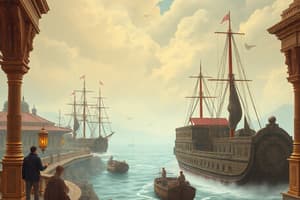Podcast
Questions and Answers
What mode of transport was primarily used in 3000 BC?
What mode of transport was primarily used in 3000 BC?
- Sailboats
- Steam trains
- Chariots (correct)
- Aeroplanes
What powered steam trains during the 1800s?
What powered steam trains during the 1800s?
- Horsepower
- Boiling water (correct)
- Electric batteries
- Wind turbines
Which vehicle was developed after hot-air balloons for air travel?
Which vehicle was developed after hot-air balloons for air travel?
- Sailboats
- Balloons
- Aeroplanes (correct)
- Steam engines
How did ancient Egyptians navigate their sailboats?
How did ancient Egyptians navigate their sailboats?
What technological advancement significantly changed transportation in the 1800s?
What technological advancement significantly changed transportation in the 1800s?
Which mode of transport primarily used engines in modern times?
Which mode of transport primarily used engines in modern times?
In which year did humans first travel in hot air balloons?
In which year did humans first travel in hot air balloons?
What feature distinguishes modern metros from earlier transportation methods?
What feature distinguishes modern metros from earlier transportation methods?
How did ancient Egyptians enhance the mobility of their sailboats?
How did ancient Egyptians enhance the mobility of their sailboats?
What was a major advantage of travel by airplane in the early 1900s?
What was a major advantage of travel by airplane in the early 1900s?
What was a prevalent mode of transport before the widespread use of automobiles?
What was a prevalent mode of transport before the widespread use of automobiles?
Flashcards are hidden until you start studying
Study Notes
Early Modes of Travel
- In 3000 BC, travel was primarily conducted using chariots.
- By 3500 BC, the evolution from chariots to wagons occurred, commonly drawn by two to four horses.
- The introduction of stagecoaches came later, typically pulled by four to six horses for longer journeys.
Ancient Maritime Innovation
- Around 3100 BC, the Ancient Egyptians pioneered the construction of the first sailboats.
- These sailboats utilized winds to propel forward through sails, supplemented by the use of oars for additional movement.
Industrial Advancements in Travel
- The Industrial Revolution in the 1800s marked a significant shift in transportation, introducing machines as travel aids.
- Steam trains became prevalent, powered by a steam engine that functioned through the process of boiling water.
Air Travel Development
- In the 1900s, the first hot-air balloons allowed for aerial travel, setting the stage for further innovations in air transportation.
- The invention of the aeroplane revolutionized long-distance travel, establishing planes as the preferred mode for covering expansive distances.
Modern Travel Trends
- Today, cars dominate personal travel, facilitating convenient transportation for individuals and families.
- The metro system has gained immense popularity; it operates on electricity and typically runs underground, providing efficient urban transit.
- Trains are recognized for their speed and direct routes, making them ideal for intercity travel, enhancing connectivity between major urban centers.
History of Transportation
- 3500 BC: Chariots were used for travel, marking early advancements in land transportation.
- 3100 BC: The ancient Egyptians constructed the first sailboats, harnessing wind for movement and utilizing long wooden oars for navigation.
- 1800s: The Industrial Revolution led to the creation of steam trains, which operated through the use of steam engines powered by boiling water.
- 1783: The first successful manned flight occurred in a hot air balloon, showcasing humanity's experimentation with air travel.
- Early 1900s: The development of airplanes with wings and engines revolutionized air travel, establishing it as the preferred method for covering long distances.
Modern Forms of Transport
- Cars have become the primary mode of transportation due to their speed and convenience, facilitating personal travel.
- Modern boats, built with metal and equipped with engines, are larger, safer, and faster compared to historical vessels.
- The metro system has gained popularity, running on electricity and typically located underground, enhancing urban mobility.
- Contemporary trains are designed for high speeds and direct routes, optimizing travel between cities.
Studying That Suits You
Use AI to generate personalized quizzes and flashcards to suit your learning preferences.




